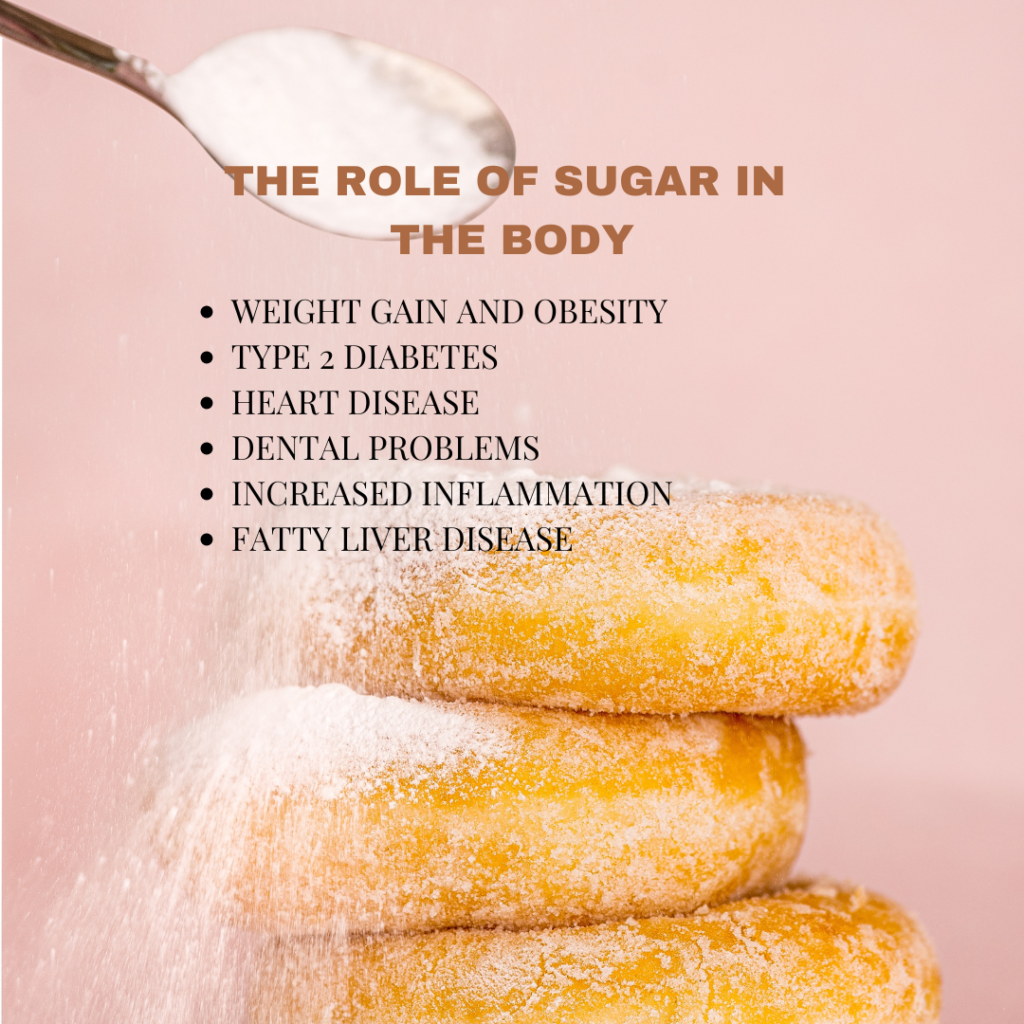Sugar is an essential component of the modern diet, and it is frequently hidden in processed foods and beverages.
The no-sugar diet has recently received attention for its possible health benefits, which include weight loss and illness prevention.
But how effective is eliminating sugar, and what are the pros and drawbacks? This article investigates the effects of a sugar-free diet on the body and if it is a lasting lifestyle change.
What is a No Sugar Diet?
A no sugar diet eliminates all added sugars, such as those found in sweets, pastries, and soft drinks, while permitting natural sugars from fruits and vegetables because of their nutritional value.
This diet seeks to encourage weight loss and enhance overall health by avoiding empty calories found in added sugars.
The Role of Sugar in the Body
Before diving into the benefits of cutting sugar, it’s essential to understand the role that sugar plays in the body. Glucose, a simple form of sugar, is a primary source of energy for our cells.
When we eat carbohydrates, the body converts them into glucose, which is then used for fuel.
However, consuming too much sugar, especially added sugar, can lead to problems. Excessive sugar intake is linked to a wide range of health issues, including:
- Weight gain and obesity
- Type 2 diabetes
- Heart disease
- Dental problems
- Increased inflammation
- Fatty liver disease
The challenge with sugar is that it’s highly addictive, which can make it difficult for people to control their intake.
This is why many turn to a no sugar diet to break the cycle of sugar addiction and regain control over their health.

Benefits of a No Sugar Diet
1. Weight Loss and Improved Metabolism
Weight loss is a major advantage of a no-sugar diet since it eliminates empty calories that contribute to obesity.
Without the spikes and crashes caused by sugary meals, cravings frequently lessen, making it simpler to maintain good eating habits.
Reduced sugar intake can also improve metabolism, allowing the body to burn fat more efficiently, supporting long-term weight management, and lowering the risk of illnesses such as metabolic syndrome.
2. Better Heart Health
- Excess sugar consumption raises the risk of cardiovascular disease.
- A sugar-free diet helps to reduce blood pressure and bad cholesterol (LDL).
- It enhances total cardiovascular health.
- Reduced sugar consumption leads to lower inflammation levels.
- Research indicates that people who consume less added sugar have improved cardiac function.
- Eliminating sugar benefits both your heart and your waistline.
3. Reduced Risk of Type 2 Diabetes
One of the most significant benefits of a no-sugar diet is its ability to reduce the risk of type 2 diabetes.
Excess sugar can cause insulin resistance, driving your body towards this life-changing disease.
Cutting out added sugars not only improves insulin sensitivity and blood sugar levels, but it also protects your future health and prevents diabetes.
4. Improved Mental Clarity and Focus
Have you ever experienced a sugar crash after eating something sweet? The sudden spike and subsequent drop in blood sugar can leave you feeling tired, irritable, and unfocused. On a no sugar diet, these crashes become a thing of the past.
Many people report improved mental clarity and sustained energy levels after cutting out sugar. Without the constant fluctuations in blood sugar, your brain can function more efficiently, leading to better focus and productivity throughout the day.
5. Clearer Skin
High sugar intake has been linked to acne and other skin issues due to the inflammatory response it triggers in the body. By eliminating sugar, you can reduce inflammation and promote healthier, clearer skin.
Many people who switch to a no sugar diet notice improvements in their complexion, reduced breakouts, and a more youthful appearance.
6. Better Digestive Health
A no sugar diet can also have a positive impact on your digestive system. Processed sugars can disrupt the balance of good bacteria in the gut, leading to bloating, indigestion, and other gastrointestinal issues.
By cutting out added sugars, you’re allowing your gut to restore its natural balance, leading to improved digestion and reduced discomfort.
7. Decreased Risk of Cancer
There is some evidence to suggest that a high sugar diet can increase the risk of certain types of cancer, particularly cancers related to obesity and insulin resistance.
By reducing sugar intake, you may lower your risk of developing these cancers and improve your overall longevity.
Challenges of a No Sugar Diet
While there are numerous benefits to cutting out sugar, a no sugar diet can also present some challenges, especially in the beginning. Here are a few common difficulties people face when transitioning to this lifestyle:
1. Sugar Cravings
Since sugar is highly addictive, many people experience intense sugar cravings during the first few weeks of a no sugar diet. These cravings can make it difficult to stick to the plan, but they typically decrease over time as your body adjusts to the absence of sugar.
To combat cravings, it’s essential to stay hydrated, eat balanced meals rich in protein and healthy fats, and avoid situations where sugary snacks are easily accessible.
2. Difficulty in Finding Sugar-Free Products
Sugar is hidden in many processed foods, often under different names like high-fructose corn syrup, dextrose, and maltose. This makes it challenging to identify products that are truly sugar-free. To succeed on a no sugar diet, it’s important to read labels carefully and opt for whole, unprocessed foods whenever possible.
3. Social and Cultural Barriers
Food plays a significant role in social gatherings, and sugar is often a central component of celebratory meals, desserts, and beverages. This can make it difficult to adhere to a no sugar diet in social settings. It may require some creative thinking, like bringing your own snacks or finding sugar-free alternatives to enjoy with others.
4. Lack of Energy in the Beginning
Some people experience a temporary dip in energy levels when they first eliminate sugar from their diet. This is because the body is adjusting to using fat as its primary energy source instead of sugar. While this transition period can be uncomfortable, energy levels typically rebound within a few weeks as the body adapts to the new fuel source.
Tips for Success on a No Sugar Diet
If you’re considering starting a no sugar diet, here are some tips to help you succeed:
- Plan your meals in advance to avoid reaching for sugary snacks when you’re hungry.
- Stock up on whole foods like fruits, vegetables, lean proteins, and healthy fats.
- Stay hydrated, as dehydration can sometimes be mistaken for hunger or cravings.
- Find healthy sugar alternatives, such as stevia or monk fruit, to satisfy your sweet tooth without consuming added sugar.
- Be patient with yourself, especially in the beginning. The transition can be challenging, but the long-term benefits are worth the effort.
How to Maintain a No Sugar Diet Long-Term
Maintaining a no sugar diet long-term requires a combination of discipline, planning, and a positive mindset. While the initial phases might be challenging, over time, it becomes easier to sustain this lifestyle as your body adjusts to fewer cravings and balanced blood sugar levels.
1. Set Realistic Goals
It’s crucial to recognise that eliminating sugar completely from your diet overnight may not be possible for everyone. Setting achievable, gradual goals is a more sustainable approach. You might start by avoiding sugary beverages or limiting the number of sweets you consume each day. As you get more comfortable, progressively eliminate more sources of added sugar.
2. Meal Prep for Success
One of the most effective strategies to stick to a no-sugar diet is to plan your meals ahead of time. When you keep nutritious, sugar-free meals and snacks on hand, you are less inclined to choose processed or sugary foods for convenience. Consider preparing in batches, such as salads, soups, or roasted veggies, which may be refrigerated and used throughout the week.
3. Find Sugar-Free Substitutes
Even on a sugar-free diet, it’s natural to need something sweet from time to time. Fortunately, there are sugar-free options that will fulfil your desires without jeopardising your diet. Natural sweeteners, such as monk fruit, stevia, and erythritol, are good choices for sweetening foods without adding calories or raising blood sugar.
You can also satisfy cravings by eating naturally sweet items such as berries or unsweetened almond butter. Your taste buds will adjust over time, and you will no longer crave extremely sugary treats.
4. Stay Educated About Hidden Sugars
As previously stated, hidden sugars can be tricky. Many processed goods, including savoury ones like bread, sauces, and dressings, include added sugar. To stick to a no-sugar diet, you must first get familiar with various sugar words, such as maltodextrin, sucrose, and agave nectar. Reading ingredient labels attentively can help you avoid mistakenly consuming sugar-containing items.
5. Join a Support Group or Community
- Accountability promotes long-term lifestyle adjustments.
- Joining a support group or online network boosts motivation.
- You can exchange advice, recipes, and support with others.
- Being part of a group makes it easier to stick to your sugar-free diet.
- Support from individuals on the same journey helps you keep focused on your goals.
6. Allow Occasional Treats
For many people, completely cutting out sugar forever is an unrealistic expectation. Instead, allow yourself occasional treats in moderation. If you’re attending a birthday party or holiday gathering, enjoying a small slice of cake or a dessert doesn’t have to derail your entire diet. The key is balance and making sure these treats are exceptions, not the rule.
7. Focus on the Positives
Instead of viewing a no sugar diet as a restriction, focus on the positive changes it brings to your health and lifestyle. Celebrate milestones like weight loss, improved energy levels, and better skin. Remind yourself of the long-term health benefits, such as a lower risk of chronic diseases and a healthier heart.
Is a No Sugar Diet Right for Everyone?
While a no sugar diet offers many benefits, it’s important to recognize that this approach may not be suitable for everyone.
Some people may need to maintain a certain level of sugar intake due to medical conditions, specific dietary needs, or active lifestyles. For example, athletes who engage in high-intensity training may require quick sources of glucose for energy.
Before embarking on a no sugar diet, it’s wise to consult with a healthcare professional or a registered dietitian to ensure the diet is appropriate for your individual needs and health goals.
Final Thoughts
A no-sugar diet can actually alter your life, from weight loss to increased mental clarity and lower risk of heart disease and diabetes.
Although it requires dedication and patience, the benefits are worthwhile. By eliminating additional sugars and adopting healthy habits, you are selecting a future full of energy, vitality, and well-being. Stay committed, and you’ll notice a significant improvement in your body and mind—you’ve got this!
Conclusion
A sugar-free diet can be extremely beneficial for boosting overall health, decreasing weight, and avoiding chronic diseases. While it has its drawbacks, the benefits—ranging from enhanced heart health and lower diabetes risk to clearer skin and increased mental clarity—make it a lifestyle worth adopting. You can feel the significant impacts of a no sugar diet on both your physical and mental well-being by adopting tiny, sustainable measures to minimize sugar consumption and choosing for whole, nutritious meals. This!

